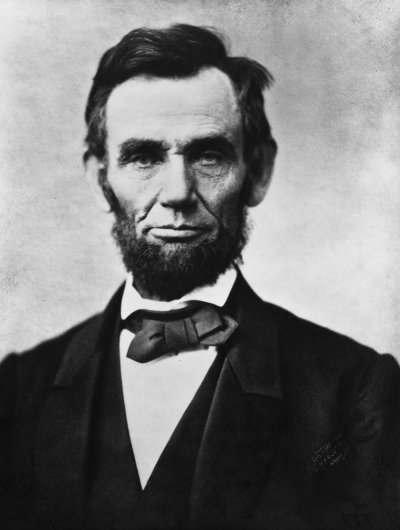|
|
Online Texts for Craig White's Literature Courses
|
|
|
Abraham Lincoln (1809-65) The Gettysburg Address (Address Delivered at the Dedication of the Cemetery at Gettysburg November 19, 1863) |
|
Historical timeline:
1 January 1863: Lincoln issues the Emancipation Proclamation. Effects:
-
legally emancipates slaves in Confederate States; slaves in other states would be emancipated by 13th Amendment to U.S. Constitution in 1865.
-
shifts goal of the Northern war effort from restoring Union to abolishing slavery
1-3 July 1863: the Battle of Gettysburg (Pennsylvania). Effects:
-
nearly 50,000 casualties for North & South combined
-
Though not immediately apparent, Gettysburg turned the tide of war. Until then, General Robert E. Lee's Army of Virginia was threatening to invade the North and even capture Washington, D.C., which might have pressed the Union to make peace and accept Secession by the Confederate states. The Confederacy might then have become a separate nation whose economy centered on slave labor. After Gettysburg, Confederate armies never again threatened the North and henceforth fought a defensive strategy.
4th of July 1863: Lincoln receives telegraph news of Union victory at Gettysburg. That night a crowd outside the White House calls for a speech. Lincoln's extemporaneous remarks prefigure the Gettysburg address's association of the Civil War with the Declaration of Independence and thus a continuation of the human progress marked by the nation's founding.
19 November 1863: Following a 2-hour speech by orator Edward Everett at the dedication ceremonies for the Gettysburg National Cemetery, Lincoln delivers the Gettysburg Address. Accounts differ on the crowd's reception and the speech's composition and delivery.
![]()
The Gettysburg Address
Four score and seven years ago our fathers brought forth on this continent, a new nation, conceived in Liberty, and dedicated to the proposition that all men are created equal. [allusion to Declaration of Independence]
Now we are engaged in a great civil war, testing whether that nation, or any nation so conceived and so dedicated, can long endure. We are met on a great battle-field of that war. We have come to dedicate a portion of that field, as a final resting place for those who here gave their lives that that nation might live. It is altogether fitting and proper that we should do this.
But, in a larger sense, we can not dedicate—we can not consecrate—we can not hallow—this ground.* The brave men, living and dead, who struggled here, have consecrated it, far above our poor power to add or detract. The world will little note, nor long remember what we say here, but it can never forget what they did here. It is for us the living, rather, to be dedicated here to the unfinished work which they who fought here have thus far so nobly advanced.** It is rather for us to be here dedicated to the great task remaining before us—that from these honored dead we take increased devotion to that cause for which they gave the last full measure of devotion—that we here highly resolve that these dead shall not have died in vain--that this nation, under God, shall have a new birth of freedom***—and that government of the people, by the people, for the people,* shall not perish from the earth.
![]()
[*anaphora / parallelism]
[** "unfinished work" and "advanced" imply American nation as developing or evolutionary progress rather than perfect origin followed by decline]
[*** "new birth" of freedom metaphor is consistent with "conceived in liberty" metaphor of first line, and potentially conforms to "born again" conversion experience and to historical idea that the 13th & 14th Amendments banning slavery and affirming equal protection under law complete the "unfinished work" of the original U.S. Constitution and thus a reborn, born-again, or redeemed USA.]
![]()
![]()


